What Is a Camping Stove?
A camping stove is a portable cooking device designed for use in outdoor environments such as campsites, hiking trails, or remote locations. These stoves come in various types, including gas, alcohol, and solid fuel models, each with its own advantages and disadvantages.
Unlike traditional kitchen stoves, camping stoves are compact, lightweight, and easy to carry. They allow campers to prepare meals even when no electricity or running water is available. This makes them an essential tool for anyone who enjoys outdoor activities.
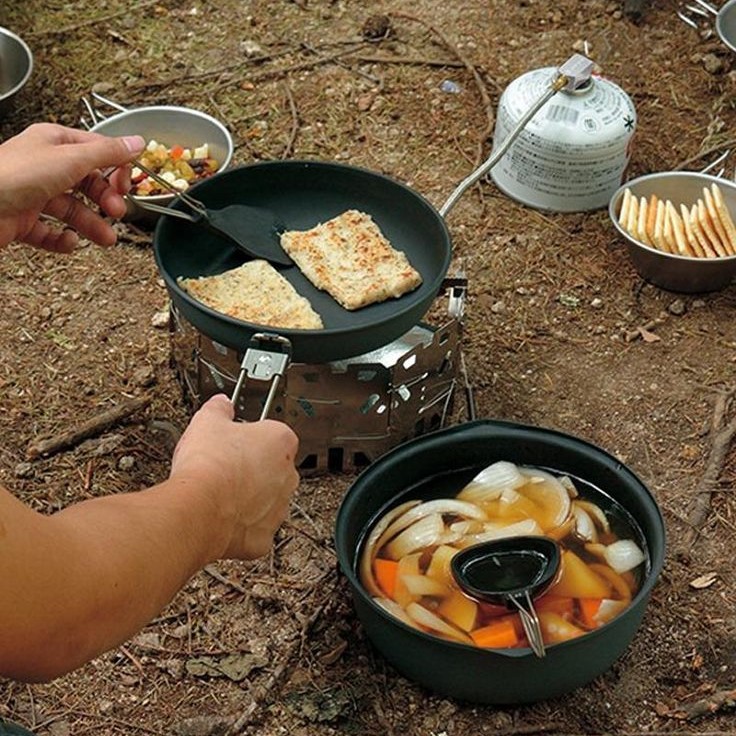
Camping stoves are particularly useful for people who go on backpacking trips, road trips, or weekend getaways. They provide a safe and convenient way to cook food while on the move. Many models are designed to be used in different weather conditions, ensuring that you can cook regardless of the environment.
In addition to their practicality, camping stoves are often built with durability in mind. High-quality models can last for years, making them a worthwhile investment for frequent campers.
Overall, a camping stove is more than just a cooking tool—it’s a vital piece of equipment that enhances the overall camping experience.
Types of Camping Stoves
When picking a camping stove, it’s essential to understand the different types available. Each type offers unique benefits depending on your camping style and needs. Here’s a closer look at popular camping stove types:
Canister Stoves
Canister stoves are lightweight and easy to use, making them perfect for backpacking. They use pre-pressurized gas canisters, which typically contain a mix of propane and butane. Lighting them is quick with built-in starters. They are compact, clean-burning, and work well in favorable weather. However, they may struggle in very cold temperatures or at high altitudes.
Liquid Fuel Stoves
Liquid fuel stoves are excellent for cold weather and high-altitude camping. They run on white gas (or other liquid fuels) and are refillable, which can save costs on longer trips. They are robust and work well in extreme conditions. However, they are heavier and require regular maintenance to stay effective.
Wood-Burning Stoves
Wood-burning stoves are eco-friendly and fueled by natural materials like twigs and leaves. They are ideal for campers who want to keep things simple and reduce fuel costs. These stoves are lightweight, but their performance depends on the availability of dry wood. They might not be the best choice in wet or windy conditions.
Alternative Fuel Stoves
Alternative fuel stoves use innovative fuel sources, such as alcohol, biomass, or solar energy. Alcohol stoves suit ultralight campers but are less powerful. Biomass stoves are versatile, letting you burn small sticks, leaves, or other organic matter. Solar stoves rely on sunlight and are great for eco-conscious campers, though weather dependency is a limitation.
Understanding these options makes choosing a camping stove easier and ensures a better outdoor experience.
Key Features to Consider
When choosing a camping stove, certain features can make or break your experience. Let’s explore key considerations to ensure your stove meets your needs.
Size and Weight
Size and weight are vital factors for campers. Backpackers need compact and lightweight stoves for easy transport. A bulky stove can make hiking uncomfortable. Car campers or group campers can opt for larger stoves since weight matters less. Consider where you’ll use the stove and the space available in your gear. Lightweight designs often trade-off durability or features, so choose carefully.
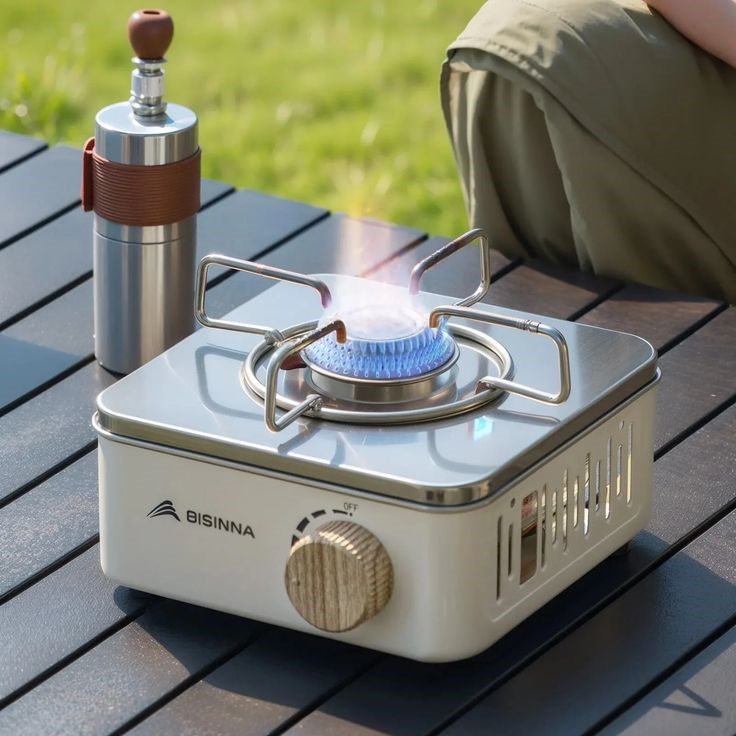
Burn Time and Fuel Efficiency
Burn time and fuel efficiency decide how long a stove can operate on a fuel source. Efficient stoves save you from carrying extra fuel, lowering your pack weight. They are crucial for extended trips or areas without easy fuel access. Factors like the fuel type, flame control, and weather affect burn time. Always match fuel efficiency with your trip duration and cooking needs.
Ignition System
A reliable ignition system simplifies stove use, especially in challenging weather. Many stoves feature built-in piezo igniters for quick starts. However, these igniters can fail, so always carry a backup, like waterproof matches. Consider stoves that allow easy lighting, even for beginners. Check reviews for stoves with dependable ignition systems before buying.
Stability and Durability
A stable stove reduces accidents, particularly when cooking on uneven surfaces. Look for stoves with wide bases or sturdy legs for support. The material also matters—stainless steel or aluminum stoves offer excellent durability. Investing in a durable stove ensures longevity and better performance on rugged trips. A wobbling or flimsy stove can ruin your cooking experience and increase safety risks.
By focusing on these features, you can find a camping stove tailored to your needs.
Best Camping Stoves for Different Activities
Choosing the right camping stove depends on your activity type and specific needs. Let’s explore the best options for various outdoor situations.
Backpacking and Hiking
Backpacking requires lightweight, compact stoves that prioritize portability. Canister stoves, known for their easy use and minimal weight, are excellent choices. They fit in small spaces and offer simple setup, ideal for solo hikers. If you frequent cold climates or high altitudes, liquid fuel stoves perform reliably. For ultralight enthusiasts, alcohol stoves might be appealing due to their lightweight design.
Car Camping
Car camping allows flexibility with weight and size, making larger stoves viable. Dual-burner propane stoves provide quick cooking for multiple people. These stoves offer ample cooking space and better control over heat levels. Consider stoves with advanced features like wind resistance or additional burners for convenience.
Group Camping
Group camping requires stoves that cater to multiple people. Liquid fuel stoves are a robust choice for these situations, given their refillable nature and reliability. Larger wood-burning stoves can also handle group needs, offering sustainable and cost-effective fuel sources. Ensure the stoves are durable and stable for heavy use.
Emergency Preparedness
For emergencies, reliable and versatile stoves are a necessity. Liquid fuel stoves are practical due to their ability to work in extreme weather. Solar-powered stoves offer a renewable solution, requiring only sunlight to cook. Biometric stoves are another option, allowing the use of easily available organic materials when traditional fuels are unavailable.
Using the right stove for your activity ensures a smoother and safer outdoor experience.
Tips for Using a Camping Stove Safely
Using a camping stove safely is essential for a fun and accident-free outdoor experience. Here are key tips to ensure safety while cooking in the wilderness.
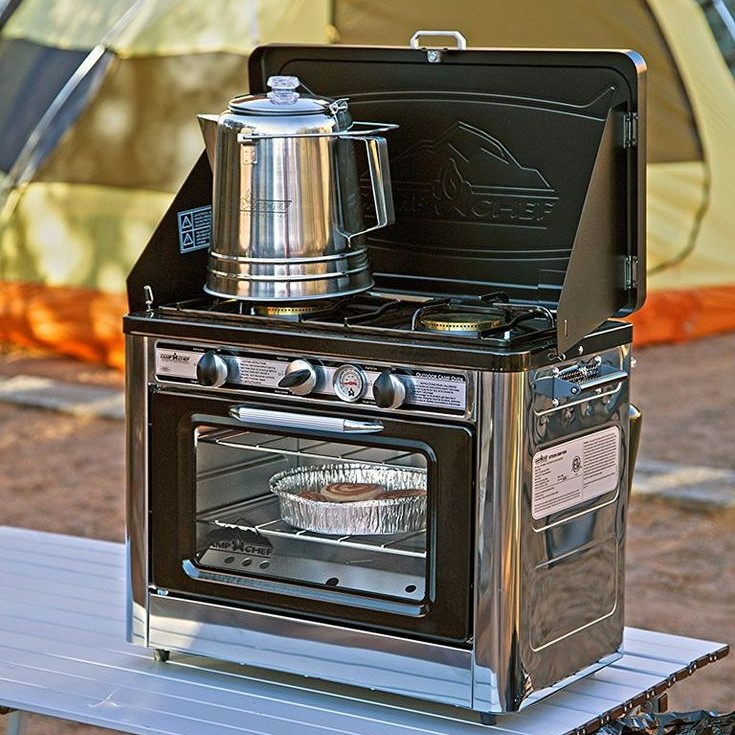
Proper Ventilation
Always use your camping stove in well-ventilated areas. This prevents harmful gas buildup, especially with fuel-burning stoves. Avoid cooking in enclosed spaces like tents or poorly ventilated shelters. If you must cook under a cover, ensure proper airflow by opening flaps or using a stove designed for indoor use. Good ventilation also reduces the risk of carbon monoxide poisoning.
Fire Safety Measures
Set up your stove on stable, non-flammable surfaces to avoid tipping accidents. Keep the area around the stove clear of dry leaves, grass, or other flammable materials. Always supervise the stove while it’s on. Bring a portable fire extinguisher or have water nearby for emergencies. Avoid using excessive heat, and turn off your stove immediately if you notice unusual behavior, like fuel leaks or flare-ups.
Fuel Transport and Storage
Transport and store fuel containers carefully to prevent leaks and spills. Keep fuel away from heat sources, direct sunlight, or sharp objects that can puncture containers. Use only the recommended fuel for your stove model. Proper sealing of fuel containers reduces the risk of evaporation and hazardous fumes. Always store fuel upright in a dedicated compartment of your gear.
By following these tips, you can enjoy safe and efficient cooking during your camping adventures.
Maintenance and Cleaning Tips
Proper maintenance ensures your camping stove lasts longer and works efficiently. Here are key tips to keep it in top shape.
Cleaning After Every Use
Clean your stove after each use to prevent residue buildup. Wipe down surfaces to remove grease and food particles. Remove detachable parts and clean them thoroughly. For canister or liquid fuel stoves, check the burner for clogs and clean it carefully. Avoid using abrasive cleaners that can damage your stove.
Maintaining Fuel Lines and Connections
Inspect fuel lines regularly to ensure there are no cracks or leaks. Tighten loose connections that can lead to fuel leaks. For liquid fuel stoves, clean and lubricate the pump and check the seals. Replace worn-out parts immediately to prevent malfunctions during trips. Regular maintenance avoids blockages and ensures safe operation.
Storing Your Stove Properly
Store your stove in a dry, cool place to prevent rust and damage. Detach fuel canisters or tanks before storing to ensure safety. For liquid fuel stoves, empty the tank to avoid leaks. Pack the stove in a protective case to shield it from bumps during transport. Proper storage prolongs the life of your stove and keeps it ready for adventures.
Recommended Accessories for Camping Stoves
Enhance your camping experience with the right accessories for your stove. These items improve performance, convenience, and safety. Here are essential accessories every camper should consider:
Windshield and Heat Reflector
A windshield protects your stove’s flame from wind interference. It ensures steady heat while cooking. Wind can cause fuel waste and slow cooking times. Use a foldable or lightweight windshield for portability. Pair it with a heat reflector to direct warmth upwards. Reflectors increase fuel efficiency and distribute heat more effectively. Together, these accessories help in cooking faster and saving fuel.
Cookware Compatibility
Choose cookware that matches your stove’s size and heat output. Avoid oversized pots that may tip or cause uneven heating. Lightweight, non-stick cookware is ideal for easy cleaning and portability. Some stoves work best with specific branded cookware. Be sure your pots and pans are stable on the stove’s surface. Proper cookware ensures efficient cooking and avoids accidents.
Multi-Tool or Repair Kit
A multi-tool is indispensable for quick fixes and adjustments. It is useful for tightening parts or cleaning small components. A repair kit is essential for addressing issues like fuel line leaks or clogged burners. Kits typically include spare seals, a cleaning needle, and lubricants. These tools help prolong your stove’s life and keep it functional on trips. Always pack these items to avoid disruptions during camping.
With these accessories, your camping stove will perform at its best. They make your outdoor cooking safer, faster, and more convenient.
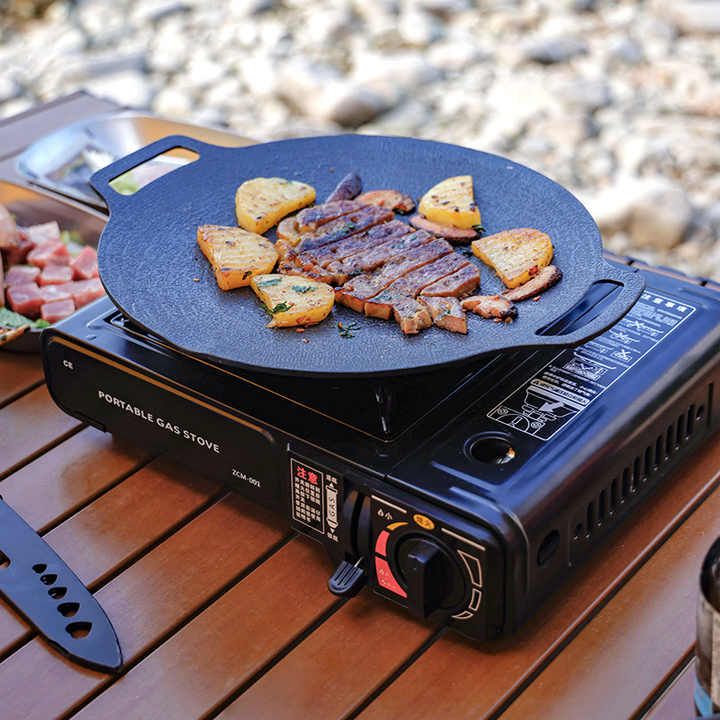
Top Camping Stove Brands to Consider
Choosing a reliable brand ensures your camping stove performs well in all conditions. Here are top camping stove brands known for quality and performance:
MSR
MSR (Mountain Safety Research) is recognized for durable and efficient camping stoves. Their stoves are designed for backpackers and mountaineers. MSR liquid fuel stoves excel in extreme weather conditions, making them ideal for challenging environments. Lightweight and compact, their canister stoves are also popular among hikers. MSR consistently delivers excellent fuel efficiency and reliable ignition systems. Many outdoor enthusiasts trust MSR for its innovation and rugged designs.
Coleman
Coleman is a household name in outdoor gear, including camping stoves. Their propane stoves are highly recommended for car camping and group trips. Many Coleman stoves feature dual burners and large cooking surfaces, perfect for family meals. These stoves are known for being user-friendly and budget-friendly. Coleman emphasizes durability, making their products long-lasting. They are a trusted choice for recreational campers seeking reliable performance.
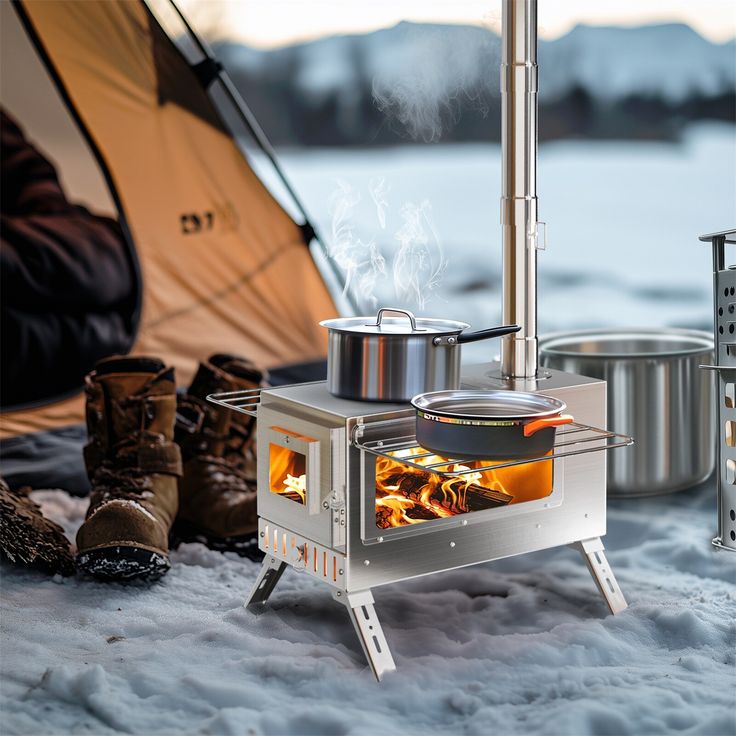
Jetboil
Jetboil specializes in compact stoves ideal for ultralight backpackers. Their all-in-one cooking systems feature integrated pots and advanced heat exchangers. This makes cooking fast and efficient, saving both fuel and time. Jetboil stoves are excellent for solo hikers or small group adventures. The brand is praised for easy assembly and portability. Their stable designs and innovative technology make them a favorite among minimalist campers.
Snow Peak
Snow Peak offers premium camping stoves with a focus on craftsmanship and sustainability. Their stoves are lightweight and designed for easy setup. Snow Peak stoves are popular for their sleek, minimalist aesthetic and high-quality materials. They cater to both backpackers and car campers with versatile models. While often pricier, Snow Peak products are built to last, ensuring great value over time. The brand is highly appreciated by campers valuing both functionality and style.
Selecting a stove from these reputable brands guarantees a reliable and enjoyable outdoor cooking experience.